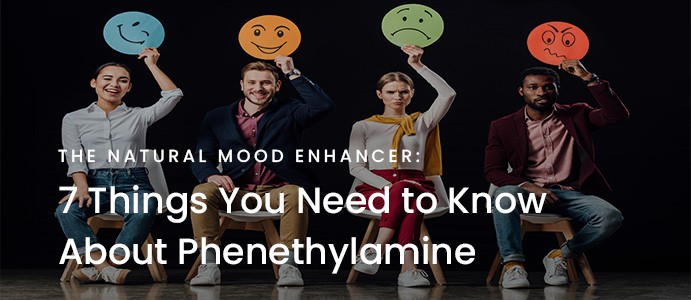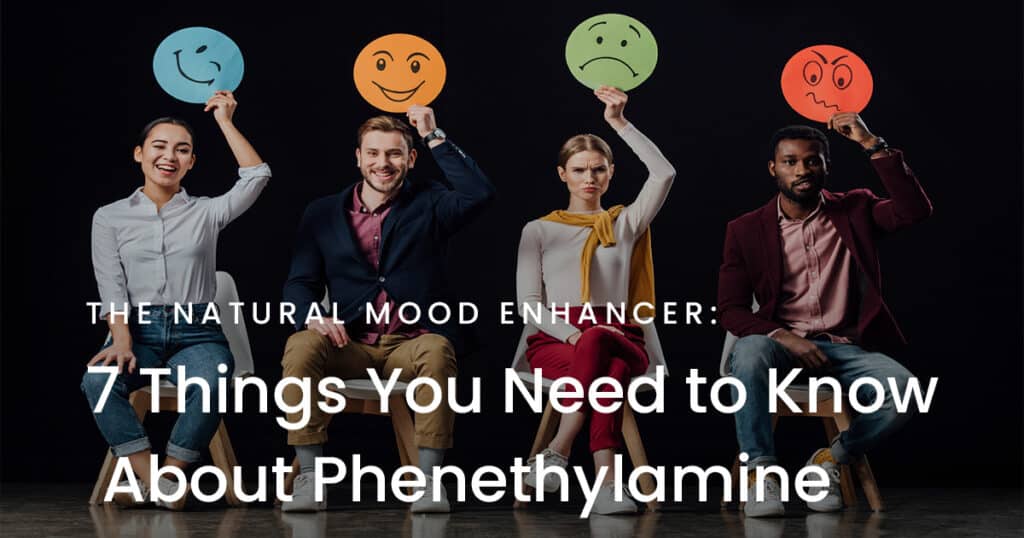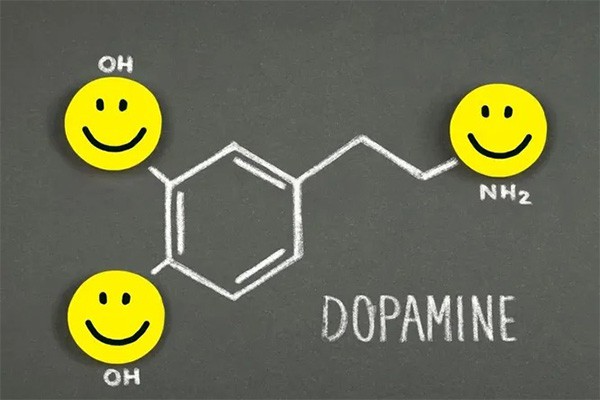

Overview
Phenethylamine, often abbreviated as PEA, is a naturally occurring compound with a rich history and a plethora of effects on the human body. Found in various sources, from the food we eat to our very own brains, PEA has garnered attention for its mood-enhancing properties and its potential therapeutic benefits.
What does Phenylethylamine do to your body?
Phenethylamine plays a pivotal role in our central nervous system. As a neurotransmitter, it influences and modulates several other neurotransmitters, most notably dopamine[1]Hossain, M., Wickramasekara, R. N., & Carvelli, L. (2014). β-Phenylethylamine requires the dopamine transporter to increase extracellular dopamine in C. elegans dopaminergic neurons. Neurochemistry International, 73, 1-31.. This influence can lead to feelings of well-being, heightened focus, and even euphoria in certain circumstances.
Is Phenylethylamine a love drug?
While PEA has been associated with feelings of infatuation and excitement that can characterize the early stages of love, it’s essential to note that it isn’t the sole contributor. Love, as a complex emotion, is influenced by a myriad of factors and neurotransmitters, including dopamine, norepinephrine, and oxytocin. Thus, while PEA plays a role, it’s just one piece of a larger puzzle.
Which foods contain Phenylethylamine?
PEA can be found in various foods, including chocolate, soybeans, blue cheese, and certain nuts[2]Amerman, D. (n.d.). Foods With Phenylethylamine. Livestrong. Retrieved from https://www.livestrong.com/article/528433-foods-with-phenylethylamine/. While the concentration of PEA in these foods might be lower compared to supplements, there’s evidence to suggest that PEA from food sources can still offer mood-boosting effects, albeit milder ones.
Functions
Phenethylamine, or PEA, is more than just a mood enhancer. At its core, PEA functions as a neurotransmitter, a chemical messenger that transmits signals across nerve endings in the body. This role allows PEA to influence various physiological processes, from mood modulation to attention span.
While PEA is primarily known for its effects on dopamine, it doesn’t stop there. It can also influence other neurotransmitters, such as norepinephrine and serotonin[3]Kaufman, R. C. (n.d.). The Science of PEA — The Brain’s Natural Stimulant for Higher Performance and Longevity. NaturoDoc. Retrieved from https://naturodoc.com/articles/the-science-of-pea, albeit to a lesser extent. This multifaceted influence gives PEA its unique profile in the realm of neurotransmitters.
Does Phenylethylamine affect dopamine?

Yes, Phenethylamine does have an effect on dopamine. Dopamine, often referred to as the “feel-good” neurotransmitter, is associated with feelings of pleasure, reward, and motivation. PEA can influence the release of dopamine[4]Integrative Psychiatry. (2017). PEA – Your Brain’s Natural Stimulant for Higher Performance and Increased Longevity. Retrieved from https://www.integrativepsychiatry.net/pea-your-brains-natural-stimulant-for-higher-performance-and-increased-longevity/, but it’s essential to understand that this relationship is complex and not yet fully grasped by the scientific community.
Is Phenylethylamine a stimulant?
Phenylethylamine acts as a central nervous system stimulant. However, its stimulating effects are relatively mild, especially when compared to other stimulants like caffeine or amphetamines. While PEA can lead to heightened alertness and improved focus, its impact is subtle and varies among individuals.
Benefits
Phenylethylamine (PEA) is more than just a neurotransmitter; it’s a compound that offers a range of potential benefits. From its influence on mood to its possible therapeutic uses, PEA’s effects have garnered attention in both scientific and wellness communities.
How does Phenylethylamine make you feel?
PEA has been associated with feelings of well-being and euphoria[5]Clinical Education. (n.d.). PEA – a Natural Antidepressant. Retrieved from https://www.clinicaleducation.org/resources/reviews/pea-a-natural-antidepressant/. However, it’s essential to understand that its effects on mood can vary widely among individuals. While some might experience mood-boosting effects, others might not notice any significant change. Factors such as individual metabolism, dosage, and other personal variables can influence these effects.
How does PEA make you feel?
PEA can potentially induce feelings of happiness, alertness, and increased energy. However, these effects are not guaranteed and can vary based on dosage, individual metabolism, and other factors. It’s always recommended to approach PEA with an understanding of its variable effects.
Is PEA good for depression?

There’s interest in the potential of PEA as a natural remedy for depression due to its influence on neurotransmitters. Some preliminary studies suggest that PEA might offer relief for those with mild to moderate depressive symptoms[6]Clinical Education. (n.d.). PEA – a Natural Antidepressant. Retrieved from https://www.clinicaleducation.org/resources/reviews/pea-a-natural-antidepressant/. However, it’s crucial to note that PEA is not an FDA-approved treatment for depression, and more research is needed to confirm its efficacy.
Is PEA an anti-inflammatory?
There’s evidence to suggest that PEA might have anti-inflammatory properties. However, the research in this area is still in its early stages. More studies are needed to confirm these findings and determine the optimal dosage for anti-inflammatory purposes.
Side Effects
While Phenylethylamine (PEA) offers potential benefits, it’s essential to be aware of its potential side effects. Like any substance, PEA can have negative impacts on the body, especially when consumed in excessive amounts or without proper guidance.
Can you take too much PEA?
Yes, excessive consumption of PEA can lead to a range of side effects. Overdosing can result in symptoms such as headaches, dizziness, rapid heartbeat, anxiety, nausea, and insomnia[7]BulkSupplements Staff. (2020, May 21). Phenylethylamine HCL (PEA): Benefits, Side Effects & Dosage. BulkSupplements. Retrieved from https://community.bulksupplements.com/phenylethylamine-hcl-pea-benefits-side-effects-dosage/. It’s crucial to adhere to recommended dosages and consult with a healthcare professional before starting any PEA supplementation.
Does PEA make you sleepy?
While PEA is primarily known for its stimulating effects, a minority of individuals might experience fatigue or drowsiness. However, for most, PEA tends to have stimulating effects.
Does PEA cause weight gain?
While there’s no direct evidence that PEA itself causes weight gain, it’s worth noting that PEA can increase appetite in some individuals. This increased appetite could potentially lead to weight gain if not managed through diet or exercise.
What are the bad effects of PEA?
Apart from the commonly reported symptoms like headaches, dizziness, and anxiety, excessive PEA intake can, in rare cases, lead to:
- Increased blood pressure
- Shortness of breath
- Confusion
Does PEA affect the liver?
PEA is metabolized by the liver. While there’s limited research on PEA’s direct effects on the liver, excessive intake could potentially strain or damage the liver over time.
Does PEA affect kidneys?
PEA is also metabolized by the kidneys. While there’s no substantial evidence to suggest a direct negative impact, excessive intake could potentially strain or damage the kidneys.
Precautions
Phenylethylamine (PEA) has garnered attention for its potential benefits, but like any substance, it’s essential to approach its consumption with caution. Understanding the precautions associated with PEA can help ensure its safe and effective use.
What are the negatives of PEA protein?
While Phenylethylamine (PEA) and PEA protein are distinct, it’s important to be aware of potential side effects associated with PEA protein. Derived from yellow peas and used as a plant-based protein source, PEA protein can cause digestive discomfort in some individuals, leading to symptoms like bloating, gas, and stomach cramps[8]Braverman, J. (2019). Pea Protein Side Effects. Livestrong. Retrieved from https://www.livestrong.com/article/339525-pea-protein-side-effects/. Additionally, while allergies to PEA protein are rare, they can be serious. It’s crucial to be aware of this risk, especially if considering PEA protein supplements. As for the taste or texture of PEA protein, preferences vary. Some might find it less appealing than other protein sources, while others have no issues with its taste or texture.
Do you need a prescription for PEA in Australia?
Phenylethylamine (PEA) is available as a supplement in many countries. However, its legality can vary. In Australia, there are specific regulations concerning the sale and consumption of PEA. These regulations can change, so it’s essential to stay updated with the latest guidelines and consult local regulations or a healthcare professional before purchasing or consuming PEA in Australia.
Interactions
Phenylethylamine (PEA) has the potential to interact with other substances, medications, or certain conditions. The nature and extent of these interactions can vary widely depending on the individual and the specific substance or condition involved. While some interactions are understood, more research is needed to fully grasp the breadth of PEA’s interactions.
Is PEA good for anxiety?

PEA’s effects on mood are multifaceted. While many individuals report feelings of happiness and a reduction in depressive symptoms, others might experience the opposite. When it comes to anxiety, PEA’s role is complex. Some individuals, especially those with anxiety, might find that PEA alleviates their symptoms. However, due to its stimulating properties, others might find that it exacerbates their anxiety, especially at higher doses. It’s not a one-size-fits-all scenario. While it’s essential to approach PEA with an understanding of its variable effects, not everyone with a history of anxiety or those on anxiety medications will necessarily experience adverse reactions. Regardless, consulting with a healthcare professional before starting PEA is crucial to ensure safety and appropriateness for one’s specific situation.
Dosing
Determining the correct dosage of Phenylethylamine (PEA) is pivotal for maximizing its benefits while minimizing potential side effects. While the appropriate dosage can vary based on individual factors, more research is needed to determine the optimal dosage for different people and conditions.
How do you increase Phenylethylamine?
- Dietary Sources: While foods like chocolate contain PEA, the amount is relatively low, and it’s unlikely to have a significant mood-altering effect from dietary sources alone.
- Supplementation: PEA supplements come in various forms, including capsules and powders. However, it’s crucial to recognize that not all PEA supplements are of the same quality. Some might have varying PEA levels, and others could be contaminated. Always choose a reputable brand and start with a lower dose, gradually increasing while monitoring for any adverse reactions.
- Combination with other supplements: Some supplements might enhance PEA’s effects or prolong its presence in the system. However, before combining PEA with other supplements or medications, it’s essential to consult with a healthcare professional to ensure safety.
How long does it take for PEA to work?
The onset of PEA’s effects can be relatively quick, with many individuals noting mood-enhancing properties within 30 minutes to an hour post-consumption. However, the duration and intensity of its effects can vary. While some might experience immediate benefits, consistent supplementation over an extended period might be necessary for others to notice significant changes.
Conclusion
Phenylethylamine (PEA) is a naturally occurring compound with potential mood-enhancing properties. While it offers various benefits, it’s essential to approach its consumption with caution, understanding its potential side effects, interactions, and the importance of correct dosing. As with any supplement, it’s crucial to consult with a healthcare professional before starting PEA to ensure its safety and appropriateness for one’s specific situation.
References
| ↑1 | Hossain, M., Wickramasekara, R. N., & Carvelli, L. (2014). β-Phenylethylamine requires the dopamine transporter to increase extracellular dopamine in C. elegans dopaminergic neurons. Neurochemistry International, 73, 1-31. |
|---|---|
| ↑2 | Amerman, D. (n.d.). Foods With Phenylethylamine. Livestrong. Retrieved from https://www.livestrong.com/article/528433-foods-with-phenylethylamine/ |
| ↑3 | Kaufman, R. C. (n.d.). The Science of PEA — The Brain’s Natural Stimulant for Higher Performance and Longevity. NaturoDoc. Retrieved from https://naturodoc.com/articles/the-science-of-pea |
| ↑4 | Integrative Psychiatry. (2017). PEA – Your Brain’s Natural Stimulant for Higher Performance and Increased Longevity. Retrieved from https://www.integrativepsychiatry.net/pea-your-brains-natural-stimulant-for-higher-performance-and-increased-longevity/ |
| ↑5, ↑6 | Clinical Education. (n.d.). PEA – a Natural Antidepressant. Retrieved from https://www.clinicaleducation.org/resources/reviews/pea-a-natural-antidepressant/ |
| ↑7 | BulkSupplements Staff. (2020, May 21). Phenylethylamine HCL (PEA): Benefits, Side Effects & Dosage. BulkSupplements. Retrieved from https://community.bulksupplements.com/phenylethylamine-hcl-pea-benefits-side-effects-dosage/ |
| ↑8 | Braverman, J. (2019). Pea Protein Side Effects. Livestrong. Retrieved from https://www.livestrong.com/article/339525-pea-protein-side-effects/ |

Leave a Reply